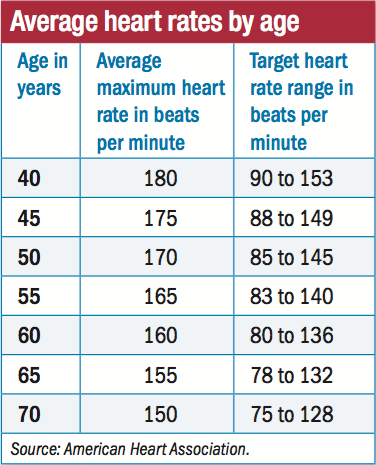Usually this is when your exercise heart rate pulse is 60 to 80 of your maximum heart rate. The normal RHR range for adults is between 60 and 100 beats per minute.
 What Your Heart Rate Is Telling You Harvard Health
What Your Heart Rate Is Telling You Harvard Health
Your resting heart rate.

What is your normal pulse rate. What Is a Normal Heart Rate. Whats a normal heart rate. A normal resting heart rate should be 60100 beats per minute but it can vary from minute to minute.
A normal resting heart rate is usually between 60 and 100 beats per minute. Normal heart rate varies from person to person but a normal range for adults is 60 to 100 beats per. Its a good idea to take your pulse occasionally to get a sense of whats normal for you and to identify unusual changes in rate or regularity that may warrant medical attention.
For adults 18 and older a typical resting heart rate is in between 60 and 100 beats per minute bpm depending upon the individuals physical condition and age. How Other Factors Affect Heart Rate Air temperature. Children tend to have higher resting heart rates than adults.
For example a well-trained athlete might have a normal resting heart rate closer to 40 beats per minute. Resting sitting or standing your pulse is usually the same. According to the American Heart Association AHA the average resting heart rate is between 60 and 100 beats per minute.
When you are at rest your heart is pumping the lowest amount of blood to supply the oxygen your bodys needs. As per the American Heart Association AHA if you are an adult your heart rate should be in the range of 60 to 100 beats per minute. 5 rader What Is The Normal Pulse Rate For Adults.
Generally a lower heart rate at rest implies more efficient heart function and better cardiovascular fitness. The normal resting heart rate for adults over the. Your pulse rate is the number of times your heart beats per minute.
Heart rate also known as pulse is the number of times a persons heart beats per minute. Most adults have a resting heart rate between 60 and 100bpm. Your heart rate also known as your pulse is a standard measurement of how many times your heart beats per minute and increases or decreases depending on how hard youre exerting yourself.
When youre active your heart beats faster to get more oxygen to your working muscles. A normal resting heart rate for adults ranges from 60 to 100 beats per minute. The heart rate gets progressively slower as a person moves through childhood toward adolescence.
Your target heart rate when exercising is normally 60 to 80 percent of your maximum heart rate. For children ages 6 to 15 the normal resting heart rate is in between 70 and 100 bpm according to the AHA. For adults the normal pulse rate is.
See a GP if youre worried about your pulse. As such keeping tabs on your heart rate manually or with a heart rate monitor is a great way to gauge intensity during different forms of exercise such as walking. If youve been active youll need to wait at least five minutes before taking your pulse.
Your number may vary. An athlete or more active person may have a resting heart rate as low as 40 beats per minute. If you regularly pay attention to your RHR that can help you notice when something isnt quite right.
It can go up to 130150 beats or higher per minute when youre exercising thats normal because the body needs to pump more oxygen-rich blood around the body. Having a rate that exceeds this is known as tachycardia a heart rate that exceeds. However this number may rise with age and is.
Sometimes as you stand for the first 15 to. For most of us between 60 and 100 beats per minute bpm is normal1 The rate can be affected by factors like stress anxiety hormones medication and how physically active you are. 1 However whats normal for you might be abnormal for someone else.
The fitter you are the lower your resting heart rate is likely to be. This may be increased or decreased depending on your health factors and your health care provider may want you to limit the target heart rate zone to 50 percent. To measure your heart rate simply check your pulse.
What Is a Normal Resting Heart Rate. A normal heart rate when youre not being active is between 60 100 beats per minute. When temperatures and the humidity soar the heart pumps a little more blood so your pulse rate may.
You gain the most benefits and lessen the risks when you exercise in your target heart rate zone. In some cases your health care provider may decrease your target heart rate zone to begin with 50. And if your age is between 6 and 15 years your heart rate should be anywhere between 70 and 100 per minute.
For adults the general consensus is a normal pulse rate falls into the range of 60 to 100 beats per minute. This is called your resting heart rate.

